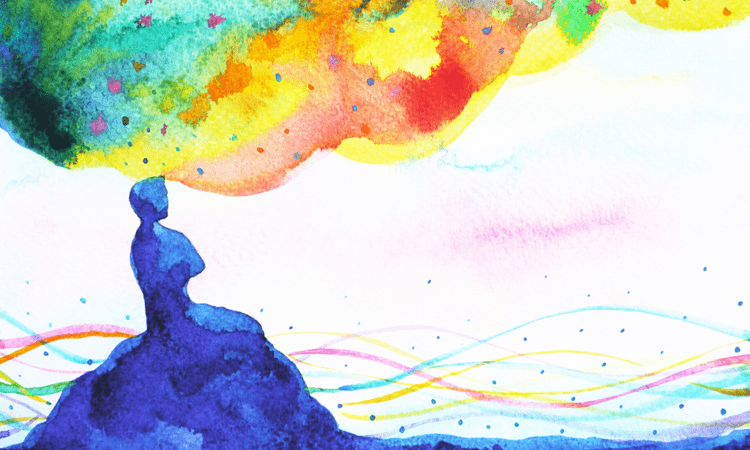Consciousness: Consciousness is the awareness of oneself, of one’s experiences, of his environment, of other people, and of the universe in which he lives as a whole. So, as ‘conscious’ individuals, are we really aware of ourselves, our environment and the universe we live in?
If our sun were the size of the dot at the top of the letter ‘i’ in a book; The Milky Way galaxy would be the size of the United States (U.S.). When we consider that there are 200 billion galaxies in the universe, 200 billion U.S. Are we aware that we live on a planet orbiting the dot of the letter ‘i’ in a universe of the size of an ‘i’?
Well, are we human beings, living on a speck of dust in a universe of this size beyond our imagination, really aware of ourselves, our environment, and other people?
A healthy human brain is an enormous information network with billions of nerve cells and trillions of synapses, interwoven with bonds, with a capacity of about 20 quadrillion operations per second and a memory capacity of 200 terabytes. Turkish thinker Tahir Musa Ceylan said, ‘… it is inefficient for such a sophisticated structure to deal only with the stimuli coming from its own body and its environment. It has brought an exciting perspective to the question we asked at the beginning, namely to the level of awareness of ourselves, our environment and other people, by saying ‘necessary’1. From this point of view, human mental processes are not just a structure that can be reduced to a single brain, but an endless and open system parallel to the infinity of the universe1. Could Einstein have spoken of the common knowledge pool of humanity, which is recorded in our minds when he said, “Imagination is more important than knowledge, because knowledge is limited to what we know and understand at the moment, while imagination embraces the whole world”? Or is Nietzsche pointing out that when we sleep and dream, we go through all the thoughts of humanity before us, that humanity’s common heritage of knowledge is hidden in an unconscious area that is in all of our minds but cannot be reached by conscious effort?
The idea that the human mind is fed from a species pool has attracted the attention of not only psychiatrists or psychologists but also neuroscientists and has been the subject of their research. Neuroscientist Prof. C. Keysers states that there is an area outside the conscious mind in the human mind where many important processes related to social cognition take place, saying that ‘it is as if our brains are wired to turn us into social animals. Humans are social animals, strongly interconnected through their minds’ 2.
Famous zoologist Richard Dawkins, in his studies with cuckoos, states that as soon as the cuckoo hatches, it carries the other eggs in the nest that it sees as rivals to itself and throws it down from the nest. . What better explanation for this than Dawkins’ statement that ‘a body is really a machine programmed by its selfish genes’? Dawkins puts forward the theory of ‘meme’ in the light of his studies, and talks about the existence of a kind of sociological genes, which he calls ‘memes’. The word ‘mem’ is derived from the Greek word ‘mimeme’, meaning ‘imitation’ in Turkish. Examining the way caddis beetles make their nests, Dawkins expressed the idea that the knowledge of how these insects should use stones, even in which softness, is coded through genes. it does. He likens this transmission to the way genes pass between bodies through the germ cells and replicate themselves in the gene pool, but that memes float in disorderly freedom in the primordial soup instead of the neatly matched, chromosomal arrangement of contemporary genes, Dawkins said. can be defined as a possessed entity, there are two things we can leave behind when we die; genes and memes. We are gene machines built to pass on our genes to the next generations.
Dawkins expresses his astonishment with the theory of the ‘meme’, which is claimed to mediate the transmission and evolution of cultural traits, by saying that ‘we biologists have embraced the idea of genetic evolution so much that we tend to forget that it is only one of the possible types of evolution’3.
Tahir Musa Ceylan, while claiming that our brains are the organs of the society and not of a person, and that they were created by the community, he states that “the beginning of any human being alive today is not the moment of birth, but the beginning of the species”1. When we consider the related words of Einstein and Nietzsche that we mentioned before, this thought of Ceylan is not without foundation. In line with Nietzsche’s thought that sleep is a tool that connects us to all humanity before us, Ceylan says, “dreams are not just replaying experiences in the object world while awake, dreams are the blending of the records of the common self with the information carried from the object world”. He draws attention to an intergenerational knowledge link 4.
The ‘Undiscovered’ Unconscious:
Thoughts that mental processes may be related to common species records began to be expressed in the world of psychiatry with the concept of “collective unconscious” by Swiss psychiatrist Carl Gustav Jung. Jung said, ‘every civilized human being, regardless of the development of consciousness, remains an archaic (oldest, original) human being in the depths of his soul. when we follow it, it is the product of a development that shows innumerable archaic features,’ he refers to the relationship of mental processes with common species records5. As can be expected, this concept has been subjected to harsh and cynical criticism from the scientific community when it first emerged, but now, as we have tried to explain, Jung’s ideas are being discussed by respected scientists in today’s science.
Species Partnership:
Man, despite all his physical limitations and weaknesses, is at the top of the food chain, controlling the planet he lives on and the other species living on the planet, and not content with that, he is the most advanced species in the universe as far as we know. So how did we manage to do this when our physical strength and limitations are incomparably weaker than many other species on our planet?
Is it simply the awareness of being conscious that the only thing that distinguishes human beings from other species on the planet and makes them superior? Our answer to this question is partially yes. Being aware of being conscious has given humanity the ability to monitor the feelings, thoughts and behaviors of itself and other people and even other species, make predictions and take precautions. But given our physical frailty as a species, in addition to this ability, the ability to act as a whole is necessary for humanity to climb to the top of the food chain. An instinct for partnership that organizes human beings as a whole as a developed structure can turn physical weakness into species advantage. As soon as a gazelle cub is born, it can walk or even run after a few tries, but it takes at least 1 year on average for a human baby to walk. At this point; According to Tahir Musa, the origin of the partnership instinct in human beings lies in the joint effort for the survival and care of the human offspring, and the evolution of this effort over generations to an instinctive character and to the instinct of partnership. characterizes their heads as a structure that can be seen but holding hands and moving as a whole under water, and emphasizes that the difference between people is only as much as the calluses, which are formed by holding the load from the front or the back while carrying a table, formed on the back of one and the chest of the other1.
According to Jung, as the individual ages, he melts into the collective psyche he came out of, drop by drop, like the Uroboros biting his own tail, the beginning and the end intersect with each other in human life, according to this idea; death is not an end, it is just a transit stop, a return to the ‘eternal stream’. This understanding leads to the idea that the meaning of human life cannot be solely in the hands of individual interests, and only thanks to this idea, despite our physical weaknesses, we can show a species development6.
We can find concrete, tangible proofs of the idea of generic partnership that we have explained so far in our own body. When a person experiences an emotion or performs an action, there is a neural firing in his brain, however, there are such specialized cells in our brain; When someone else we observe experiences an emotion or performs an action, it shows electrical activity as if our own body is performing that emotion or action, these cells are called mirror neurons, these cells respond to the behavior and emotions of the people around us, as if they were a physical part of us. they hold a mirror, they kind of socialize us2. World-renowned Hindu neurologist Ramachandran expressed the importance of these nerve cells by saying, “I guess that the discovery of DNA will revolutionize biology, mirror neurons will make in psychology.” Tahir Musa defines mirror neurons as the main biological structure that causes us all to keep a common rhythm and behave like limbs of a single living thing1. The functions of mirror neurons on internalizing the emotions of others help us to understand the existence of moral values, Keysers says in his book empathic brain; ‘Helping others through mirror neurons means helping ourselves, and we feel good from a shared joy. Against this; harming others means harming ourselves through a shared pain’ 2.
Common Self:
The knowledge gained from the life experiences of previous generations is transmitted from generation to generation, just like the inheritance of eye color and hair color. We can see this by examining the reflexes of a newborn baby. For example, let’s take the search-sucking reflex, when you lightly touch a newborn baby’s cheek, he opens his mouth and turns his mouth to the touched side, this is a necessary reflex for the baby’s feeding, it allows the baby to find the breast, as if the baby has the knowledge that it will be fed by a breast from the moment it is born. Tahir Musa explains this as ‘man is not a picture drawn by objects on an empty table (tabula-rasa), on the contrary, there is a picture of the earth in him’4. So what is it that draws this picture inside the baby? Let’s answer this question with the words of Tahir Musa, the owner of the concept, ‘The answer to this is the common self. The common self is a deep and extensive knowledge of the earth passed on by the billions of members of the human species who have lived in the past, and the baby has all of this knowledge as it comes to earth’4. As we explained before, humans transfer the information they receive from objects to their genes with their epigenetic mechanisms, so the genetic structure is the only and first structure as an extraordinary information load. Dawkins expresses this in the words that ‘the only kind of beings necessary for life to arise anywhere in the universe are immortal replicators (heredity materials)’3. This immense knowledge, which arises from life experiences throughout human history, enriches the common self by participating in the chain of inheritance from generation to generation. Tahir Musa, while evaluating the formation of the common self; He defends the idea that ‘this immense knowledge, which has flowed for thousands of years and enriched with the experiences of humanity, has an opinion about itself, the common self, the common self is the integrative sum of the self-impressions (in a sense, the selves) of every individual belonging to the human species that has ever lived’1. The common self is the whole of the common knowledge of human history, which is present in every human being at the fetal stage. According to Jung; If the individual can open this field of knowledge in his own psyche or reach the awareness of this knowledge, he will get rid of isolation and integrate with the endless cosmic process6.
Generic Happiness:
One of the questions that mankind is most curious about is the question “Are we alone in the universe?”. In order to find the answer to this question, developed western countries make new researches with billions of dollars of investments every year. 200 billion U.S. Is the lonely human being, living on a planet orbiting the point of the letter ‘i’ in a universe of the size of the universe, aware of his own personal loneliness while seeking a cure for his cosmic loneliness? What do you see when you look at people’s faces while walking on the subway or bus, or walking around a street? Happy faces? Or thousands of unhappy worlds disconnected from each other? Are we aware that we are getting further and further away from the partnership every time we press the buttons, while we hide behind our own concrete world and struggle helplessly in the grip of virtual reality? Happiness is in partnership because only when we realize that we are a part of human beings as a species will we become branches growing on the trunk of the same tree instead of being torn from each other, fallen to the ground, turned yellow, and scattering like leaves. That’s when we will be able to act as a species and eradicate hunger, poverty and wars, instead of small African bodies waiting in line for a glass of water, we will see the smiling faces of the happy children of the black continent in photographs, or no father burying his son instead of sharing happiness at his wedding. will not have to in the Middle East.
Conclusion:
The personal opinion of the author of this article is that; These studies of species partnership will not only lead to groundbreaking discoveries in neuropsychiatry or genetics, but will also be a guide for all humanity as a species to survive, evolve towards more advanced and open the door to species happiness.
Resources:
Ceylan T.M. Common Self Neurophilosophical Grounding. Istanbul: Details Publications, 2012.
Keysers C. Empathic Brain. A Eper (Trans.), Istanbul: Alfa Publication, 2011.
Dawkins R. Gene Is Selfish. E Karaarslan (Trans.), Istanbul: Kuzey Publications, 2014.
Ceylan T.M. Object Self Psychophilosophical Integration. Istanbul: Details Publications, 2013.
Jung C.G. The Undiscovered Self. B ILHAN, C.E. Sılay (Trans.), Istanbul: Barış İlhan Publishing House, 2010.
Jacobi J. C. G. Jungian Psychology. M Arab (Trans.), Istanbul: İlhan Publishing House, 2002.










































